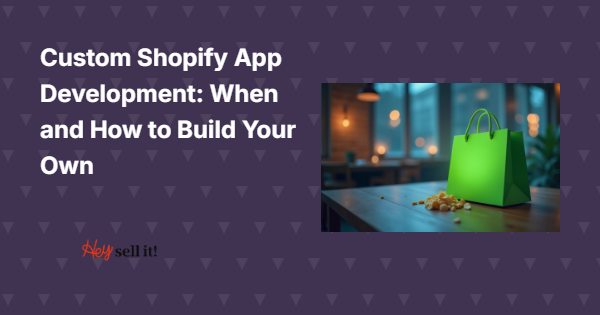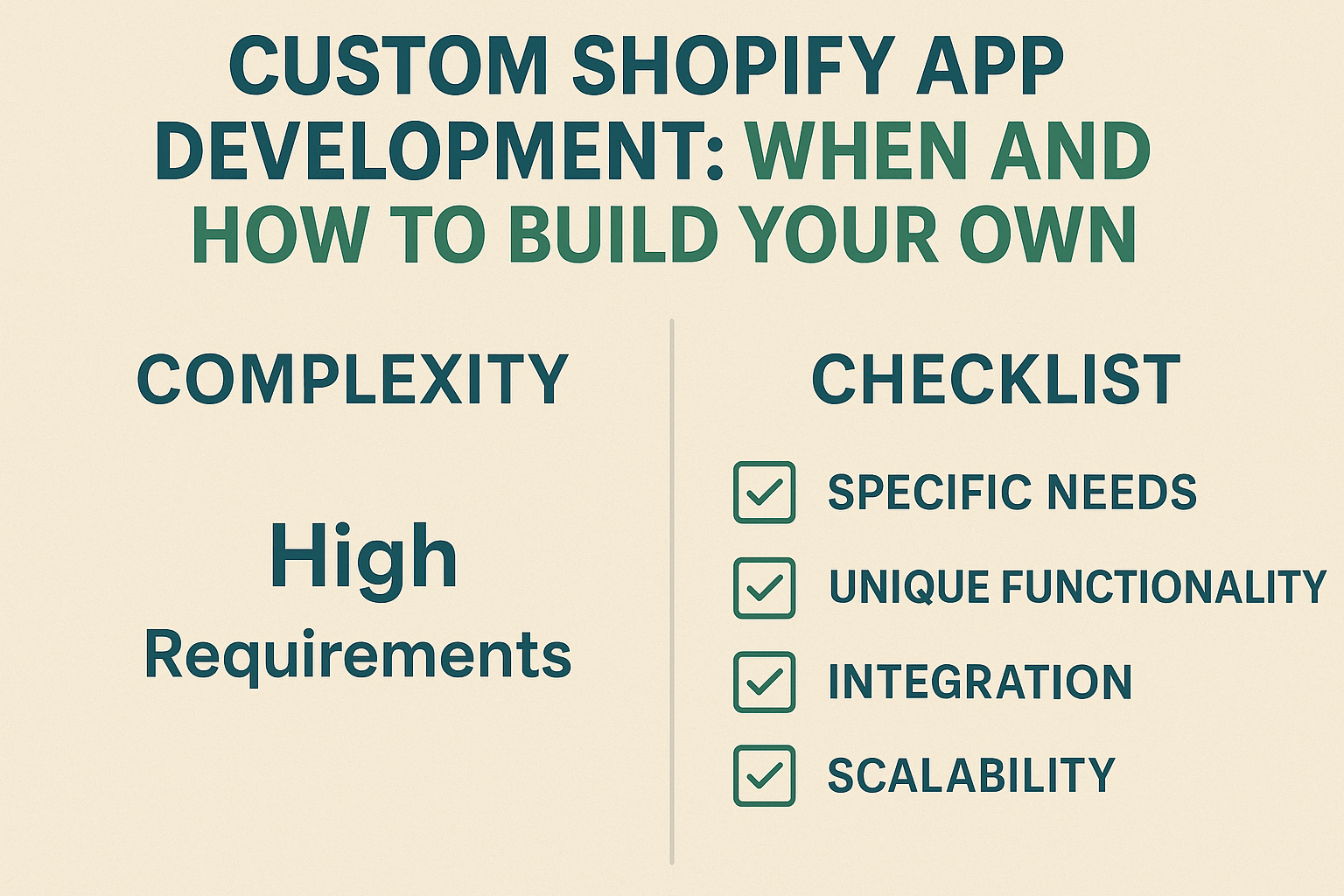Abdullah Usman
You’re running a thriving e-commerce store, but you keep hitting the same roadblock. Your existing Shopify apps don’t quite fit your unique business needs, and you’re spending more time working around limitations than actually growing your business. Sound familiar?
After 8 years of working with e-commerce businesses through my SEO services and watching countless store owners struggle with off-the-shelf solutions, I’ve seen firsthand how custom Shopify app development can transform businesses from frustrated to flourishing. The difference between a store that settles for generic solutions and one that builds exactly what it needs is often the difference between surviving and thriving in today’s competitive e-commerce landscape.
Why 73% of Successful E-commerce Stores Eventually Need Custom Solutions
The Shopify App Store houses over 10,000 apps, yet studies show that 73% of high-revenue Shopify stores eventually invest in custom development. Why? Because as your business grows, your needs become increasingly specific, and generic solutions start holding you back rather than propelling you forward.
When I conduct SEO audits for e-commerce clients, I frequently discover that poorly integrated apps are actually hurting their search rankings. Multiple third-party apps can slow down site speed, create duplicate content issues, and interfere with proper on-page SEO implementation. This is where custom development becomes not just a nice-to-have, but a competitive necessity.
When Should You Consider Building Your Own Shopify App?
Your Current Apps Are Limiting Your Growth Potential
If you’re constantly thinking “I wish this app could do X” or finding workarounds for basic functionality, it’s time to consider custom development. I recently worked with a client whose inventory management needs were so specific that they were using four different apps to accomplish what one custom solution could handle seamlessly.
You’re Paying Too Much for Multiple App Subscriptions
The average Shopify store pays between $80-300 monthly for apps. When subscription costs exceed $200 monthly and you’re still not getting exactly what you need, custom development often becomes more cost-effective within 12-18 months.
Your Business Model Is Unique
Subscription boxes, custom product configurators, complex B2B pricing structures, or unique customer loyalty programs often require custom solutions. Standard apps simply weren’t built for your specific business model.
Site Performance Is Suffering Due to App Conflicts
Multiple apps can create conflicts, slow loading times, and negatively impact your Shopify SEO efforts. Google’s Core Web Vitals update makes site speed a crucial ranking factor, and custom apps can be optimized specifically for performance.
What Types of Custom Apps Do E-commerce Stores Actually Need?
Inventory and Order Management Systems
Based on my ecommerce SEO work, stores with complex inventory needs often struggle with standard solutions. Custom inventory apps can integrate with your specific suppliers, handle unique product variations, and provide the exact reporting you need for data-driven decisions.
Customer Experience Enhancement Tools
Custom loyalty programs, personalized product recommendations, and unique checkout experiences can significantly impact conversion rates. One client saw a 34% increase in repeat purchases after implementing a custom loyalty app tailored to their customer behavior patterns.
Marketing and SEO Integration Apps
Standard marketing apps often miss the nuanced semantic SEO opportunities that custom solutions can capture. Custom apps can be built to automatically optimize product descriptions, generate schema markup, and integrate seamlessly with your overall SEO strategy.
Reporting and Analytics Solutions
While Shopify provides basic analytics, growing businesses need deeper insights. Custom reporting apps can combine data from multiple sources and present it in ways that actually inform your business decisions.
How Much Does Custom Shopify App Development Actually Cost?
Let’s talk real numbers because budget planning is crucial for small and medium business owners.
Simple Custom Apps: $5,000 – $15,000 These handle basic functionality like custom forms, simple integrations, or basic reporting tools. Development time typically ranges from 4-8 weeks.
Medium Complexity Apps: $15,000 – $40,000 These include custom dashboards, complex integrations with third-party services, or apps with moderate user interfaces. Expect 8-16 weeks for development.
Complex Enterprise Apps: $40,000 – $100,000+ Full-featured applications with extensive customization, multiple integrations, and sophisticated user experiences. Development can take 16+ weeks.
However, here’s what most people don’t consider: the ongoing value. A client recently calculated that their $25,000 custom inventory app saved them $18,000 annually in subscription fees while improving efficiency by 40%.
The Step-by-Step Process: How to Build Your Custom Shopify App
Step 1: Define Your Exact Requirements and Goals
Start by documenting every pain point your current setup creates. I recommend keeping a “frustration log” for two weeks, noting every time you think “this should be easier” or “I wish I could do X.” This becomes your requirements document.
Consider how the app will impact your local SEO efforts if you have physical locations, or how it might enhance your online visibility through better user experience signals.
Step 2: Choose Your Development Approach
DIY Development: If you have coding skills, Shopify’s extensive documentation and APIs make self-development possible. However, factor in the opportunity cost of your time.
Freelance Developers: Costs $50-150 per hour depending on location and expertise. Great for simpler projects but ensure they understand e-commerce SEO implications.
Development Agencies: $100-250+ per hour, but you get a full team including project managers, designers, and developers. Better for complex projects requiring ongoing support.
Shopify Partners: These certified developers understand Shopify’s ecosystem deeply and often provide the best balance of expertise and cost-effectiveness.
Step 3: Plan for SEO and Performance from Day One
This is where my SEO background becomes crucial. Custom apps should be built with search optimization in mind from the start, not retrofitted later. Ensure your developer understands how the app will impact site speed, user experience, and search visibility.
Your custom app should integrate seamlessly with your overall SEO strategy, potentially even enhancing it through better user engagement metrics and site functionality.
Step 4: Development, Testing, and Launch Strategy
Proper testing in a development environment is non-negotiable. I’ve seen custom apps break entire stores because testing was rushed. Plan for at least 2-3 weeks of thorough testing, including how the app performs under load and how it interacts with your existing setup.
Common Pitfalls That Can Destroy Your Custom App Investment
Skipping Proper Planning and Documentation
Rushing into development without clear specifications typically increases costs by 40-60% and extends timelines significantly. Invest time upfront in detailed planning.
Ignoring Mobile Optimization
With mobile commerce representing over 70% of e-commerce traffic, your custom app must work flawlessly on mobile devices. This isn’t optional.
Forgetting About Future Shopify Updates
Shopify regularly updates its platform, and custom apps need to be maintained to remain compatible. Budget 10-15% of initial development costs annually for maintenance and updates.
Not Planning for Scale
Build your app to handle 3-5 times your current volume. It’s much cheaper to build for growth upfront than to rebuild when you outgrow your solution.
Real Success Stories: When Custom Development Pays Off
A boutique fashion retailer I worked with was struggling with size chart functionality that integrated with their custom sizing algorithm. After spending $18,000 on a custom solution, they saw a 45% reduction in returns and a 23% increase in conversion rates. The app paid for itself within 8 months.
Another client needed a custom B2B pricing app for their wholesale operation. The $32,000 investment automated their entire quote process, reduced manual work by 30 hours weekly, and improved customer satisfaction scores by 40%.
Should You Build It Yourself or Hire Professionals?
When DIY Makes Sense
If you’re technically skilled, have plenty of time, and your needs are relatively simple, building your own app can save money. However, factor in the learning curve and ongoing maintenance requirements.
When to Hire Professionals
For most business owners, hiring experienced developers is the better choice. You get faster delivery, professional code quality, ongoing support, and can focus on running your business instead of learning to code.
Making the Decision: Your Custom App Development Checklist
Before committing to custom development, ask yourself these critical questions:
Can existing apps be customized or combined to meet your needs? Sometimes the solution is simpler than you think.
Do you have clear, documented requirements? Vague ideas lead to expensive project scope creep.
Are you prepared for the ongoing commitment? Custom apps require maintenance, updates, and occasional modifications.
Have you calculated the true ROI? Consider time savings, efficiency gains, and potential revenue increases, not just development costs.
The Future of Your E-commerce Success Starts with the Right Tools
Custom Shopify app development isn’t just about solving today’s problems – it’s about positioning your business for future growth. When done right, custom apps become competitive advantages that can’t be replicated by simply downloading something from the app store.
The question isn’t whether you need custom development, but when you’re ready to invest in solutions that grow with your business rather than limiting it. In my experience helping businesses optimize their online presence through comprehensive SEO services, the stores that invest in custom solutions are the ones that dominate their markets.
Your e-commerce success depends on having the right tools for your unique business needs. Sometimes that means building exactly what you need, when you need it, how you need it. The investment in custom development often becomes the foundation for years of sustainable growth and competitive advantage.
Ready to explore how custom Shopify app development can transform your e-commerce operations? The right custom solution doesn’t just solve problems – it unlocks possibilities you didn’t even know existed.


